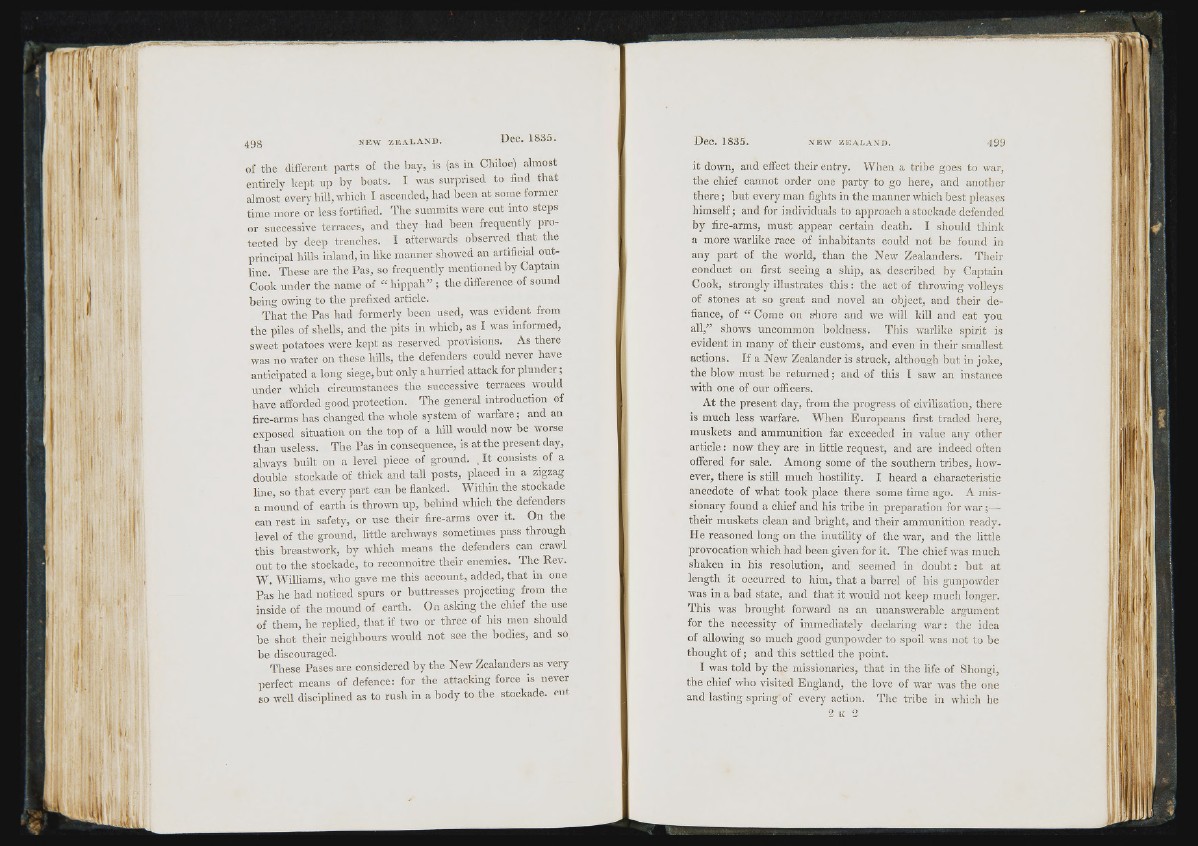
í w
of the different parts of the bay, is (as in Chiloe) almost
entirely kept up by boats. I was surprised to find that
almost every hill, wliich I ascended, had been at some former
time more or less fortified. The summits were cut into steps
or successive terraces, and they had been frequently protected
by deep trenches. I afterwards observed that the
principal hills inland, in like manner showed an artificial outline.
These are the Pas, so frequently mentioned by Captain
Cook under the name of “ hipirah” ; the difference of sound
being owing to the prefixed article.
That tbe Pas had formerly been used, was evident from
the piles of shells, and the pits in which, as I was informed,
sweet potatoes were kept as reserved provisions. As there
was no water on these hills, the defenders could never have
anticipated a long siege, but only a hurried attack for plunder;
under which circumstances the successive terraces would
have afforded good protection. The general introduction of
fire-arms has changed the whole system of warfare; and an
exposed situation on the top of a hill would now be worse
than useless. The Pas in consequence, is at the present day,
always built on a level piece of ground. . It consists of a
double stockade of thick and tall posts, placed in a zigzag
line, so that every part can be flanked. Within the stockade
a mound of earth is thrown up, behind which the defenders
can rest in safety, or use their fire-arms over it. On the
level of the ground, little archways sometimes pass through
this breastwork, by which means the defenders can crawl
out to the stockade, to reconnoitre their enemies. The Rev.
W. Williams, who gave me this account, added, that in one
Pas he had noticed spurs or buttresses projecting from the
inside of the mound of earth. On asking the chief the use
of them, he replied, that if two or three of his men should
be shot their neighbours would not see the bodies, and so
be discouraged.
These Pases are considered by the New Zealanders as very
perfect means of defence: for the attacking force is never
so well disciplined as to rush in a body to the stockade, cut
it down, and effect their entry. When a trilie goes to war,
the chief cannot order one party to go here, and another
there; but every man fights in the manner which best pleases
himself; and for individuals to approach a stockade defended
by fire-arms, must appear certain death. I should think
a more warlike race of inhabitants could not be found in
any part of the world, than the New Zealanders. Their
conduct on first seeing a ship, as described Ijy Captain
Cook, strongly illustrates th is : the act of throwing volleys
of stones at so great and novel an object, and their defiance,
of “ Come on shore and we will kill and eat you
all,” shows uncommon boldness. This warlike spirit is
evident in many of their customs, and even in their smallest
actions. If a New Zealander is struck, although but in joke,
the blow must be returned; and of this I saw an instance
with one of our officers.
At the present day, from the progress of civilization, there
is much less warfare. When Europeans first traded here,
muskets and ammunition far exceeded in value any other
article: now they are in little request, and are indeed often
offered for sale. Among some of the southern tribes, however,
there is still much hostility. I heard a characteristic
anecdote of what took place there some time ago. A missionary
found a chief and his tribe in preparation for war;—
their muskets clean and bright, and their ammunition ready.
He reasoned long on the inutility of the war, and the little
provocation which had been given for it. The chief was much
shaken in his resolution, and seemed in doubt: but at
length it occurred to him, that a barrel of his gunpowder
was in a bad state, and that it would not keep much longer.
This was brought forward as an unanswerable argument
for the necessity of immediately declaring war: the idea
of allowing so much good gunpowder to spoil was not to be
thought o f ; and this settled the point.
I was told by the missionaries, that in the life of Shongi,
the chief who visited England, the love of war was the one
and lasting spring of every action. The tribe in which he
2 E 2